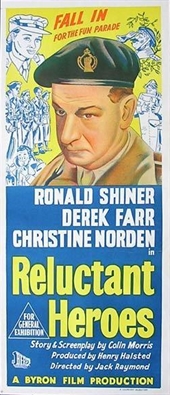Reluctant Heroes
| Reluctant Heroes | |
|---|---|
 Australian daybill poster | |
| Directed by | Jack Raymond |
| Written by | Colin Morris |
| Based on | Reluctant Heroes by Colin Morris |
| Produced by | Henry Halstead |
| Starring | |
| Cinematography | James Wilson |
| Edited by | Helen Wiggins |
| Music by | Tony Lowry |
Production company | Byron Films |
| Distributed by | Associated British-Pathé |
Release date |
|
Running time | 80 minutes |
| Country | United Kingdom |
| Language | English |
| Budget | £45,000[1] |
Reluctant Heroes is a 1952 British comedy film directed by Jack Raymond and starring Ronald Shiner, Derek Farr and Christine Norden. It is based on the popular farce of the same title by Colin Morris.[2][3] The play, which had its West End premiere at the Whitehall Theatre in September 1950, was the first of the Brian Rix company's Whitehall farces.[4] The film was shot at the Riverside Studios in Hammersmith in West London. Its sets were designed by the art director Wilfred Arnold.
Plot summary
[edit]This comedy is set in an army boot camp. It displays a drill sergeant who must somehow turn an inept group of recruits into real soldiers.
Cast
[edit]- Ronald Shiner as Sergeant Bell
- Derek Farr as Michael Tone
- Christine Norden as Gloria Dennis
- Brian Rix as Horace Gregory
- Larry Noble as Trooper Morgan
- Betty Empey as Pat Thompson
- Angela Wheatland as Penny Roberts
- Anthony Baird as Sgt. McKenzie
- Colin Morris as Captain Percy -
- Elspet Gray as Lieutenant Virginia
Reception
[edit]Box office
[edit]The film is listed in the 12 most popular films at the British box-office in 1952, in an article in the Sydney Sunday Herald that cited Ronald Shiner as the UK's favourite film star of the year.[5][6] It earned ten times its budget.[1]
Brian Rix asserts in his autobiography that it was the UK's top box office film of the year.[7]
References
[edit]- ^ a b Harper, Sue; Porter, Vincent (2003). British cinema of the 1950s : the decline of deference. Oxford University Press. p. 254.
- ^ "Reluctant Heroes (1951) - Trailers, Reviews, Synopsis, Showtimes and Cast". AllMovie. Retrieved 16 September 2013.
- ^ "Reluctant Heroes (1952)". BFI. Archived from the original on 19 May 2021. Retrieved 29 April 2022.
- ^ Ray Cooney Obituary: John Chapman, The Guardian, 8 September 2001
- ^ "COMEDIAN TOPS FILM POLL". The Sunday Herald. Sydney, NSW: National Library of Australia. 28 December 1952. p. 4. Retrieved 24 April 2012..
- ^ Thumim, Janet. "The popular cash and culture in the postwar British cinema industry". Screen. Vol. 32, no. 3. p. 259.
- ^ Rix, B. (1975) My Farce From My Elbow, Secker & Warburg, London.
External links
[edit]


 French
French Deutsch
Deutsch